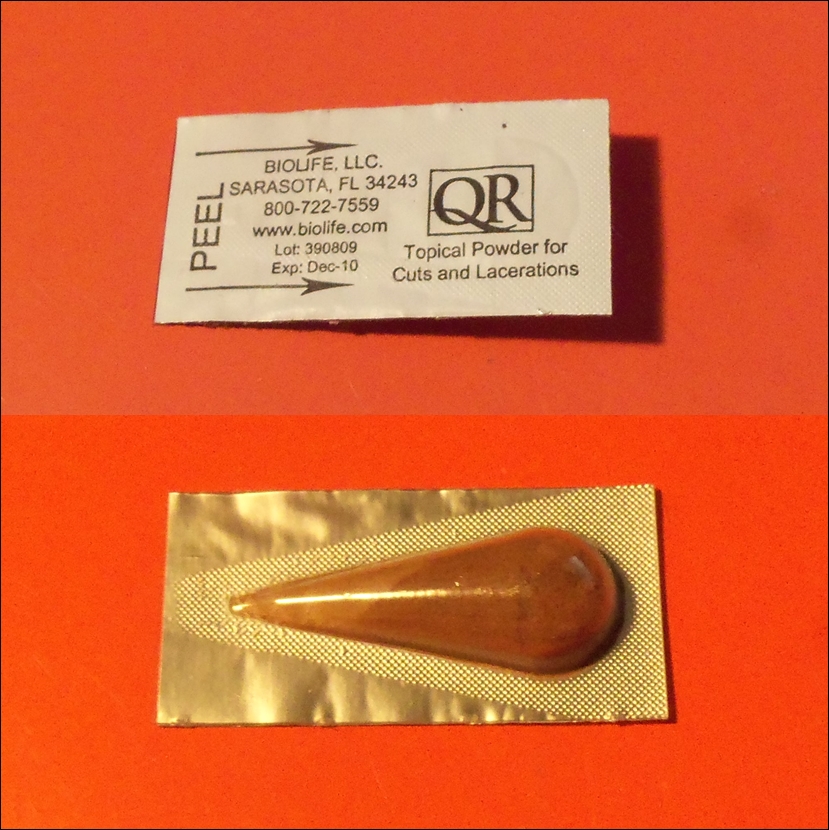Sometimes we prep so hard for the big stuff, we overlook the “simpler” and not-quite bleeding issues we can face. How about a small bleed that simply will not stop? I got caught by surprise and it was not fun feeling this dumb.
My mother is 86 years old and living with us as I may have mentioned before. she is not only diabetic but she is on blood thinners due to a prior TIA. Now, it was a matter of personal pride that our family would heal/clot “as fast as a dog” as the saying goes in Spanish. But age, diabetes and medication came to play when mom accidentally scratched out a small wart or tag in her leg and it would not stop bleeding. It was not profusely but a constant trickle that even after normal treatment, it would come back. I went from frustrated to slightly worried and racking my brain what to do short of taking a trip to the doctor
After a long while (too long for my taste) from the back of my head came the memory of having some sort of small vial of clotting agent. rummaging around I found it and just applied the dust to the small wound. Voila! instant clotting. I put one of those huge 3 inch wide band aids and problem solved.
This is the clotting agent I used: QR Woundseal.
Sharp eyes will surely noticed the expiration date. I saw that myself after application. But since it worked and mom is puttering around normally and interrupting me every 5 minutes, I reckon it worked and I won’t give it too much of a thought.
Anyway, I went ahead and ordered several two gram bags of Celox to keep in the different First Aid kits (Not the Oh Shit! kits) and add some of the big ass band aids because sometime you don’t need the whole gauze and tape production thing to attend to a small wound and small band aids just suck.


My allergist told me that the expiration date on drugs is the earliest at which full effective strength is likely to begin to fade (given halfway decent storage).
So unless the drug tends to break down into toxic byproducts, you are likely good to go. The caveat being that it might not be at full strength and therefore not as effective.
The original context was epi-pens, but he said it covers most drugs and similar products.
I vaguely remember that some regulation requires expiration dates no more than 2 years from manufacture, no matter the biochemistry involved. It’s odd to see expiration dates on lithium carbonate, for example; the real expiration date for that stuff is billions of years.
The “begin to fade” thing seems strange. A likely expiration pattern is exponential decay, which means it “begins to fade” immediately. In such a case the only meaningful definition is to pick a percentage decay. EEs would suggest 1/e as that percentage, but other significant amounts like 20% would be reasonable.
His words, not mine.
I think assuming an exponential decay of the active ingredient(s) is probably too simple in many cases … likely it will depend on packaging, encapsulation, exact degradation pathway (eg oxidation vs intrinsic instability) etc.
I need to suggest this to my BIL who takes Elloquist (sp?) blood thinners.
There are several brands and I did a check and they can be fond at the usual pharmacy chains.
CVS
https://www.cvs.com/shop/wound-seal-powder-for-people-on-blood-thinners-prodid-888211?skuid=888211
Walgreens.
https://www.walgreens.com/store/c/woundseal-powder-to-stop-bleeding/ID=prod6099456-product
Have you tried cautery with a soldering iron?
Super glue is also an option.
In fact, wasn’t that the original intended application?
Sometimes the tape alone is enough for most small cuts.
RD: Googling “eliquis” might be helpful.
I’m on Plavix, and generally find that (an extended session of) direct pressure does the trick.